第三章增词法,重复法和省略法
- 格式:doc
- 大小:62.00 KB
- 文档页数:8
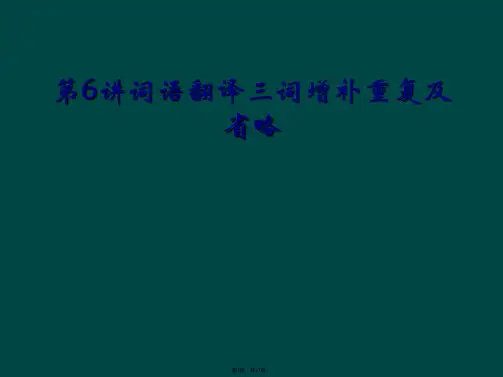
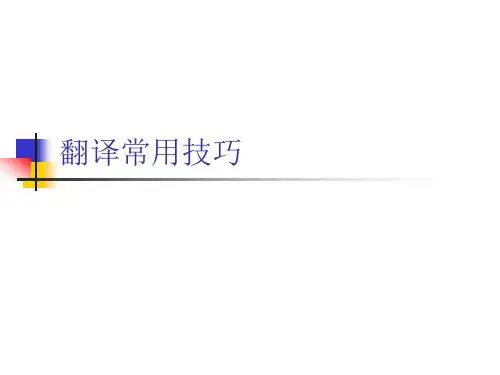
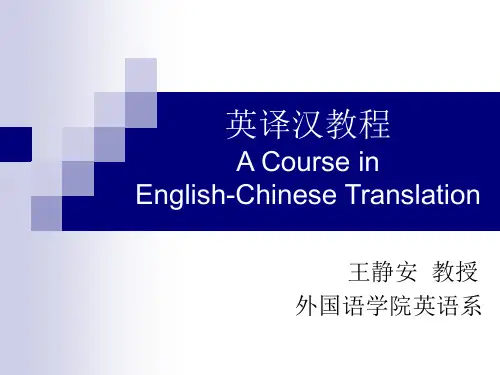
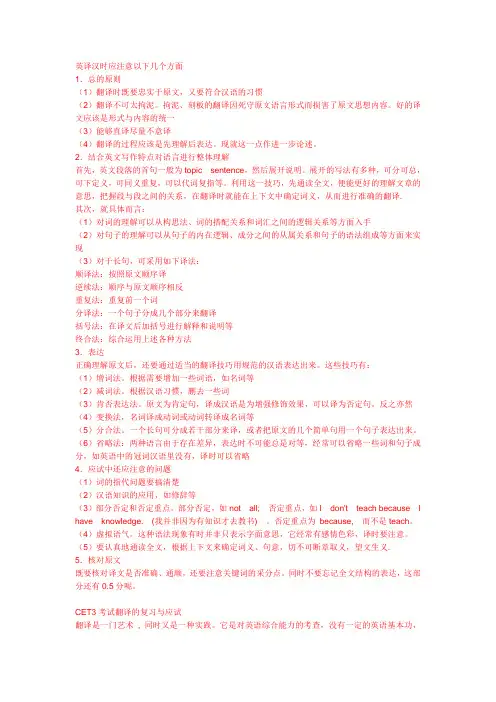
英译汉时应注意以下几个方面1.总的原则(1)翻译时既要忠实于原文,又要符合汉语的习惯(2)翻译不可太拘泥。
拘泥、刻板的翻译因死守原文语言形式而损害了原文思想内容。
好的译文应该是形式与内容的统一(3)能够直译尽量不意译(4)翻译的过程应该是先理解后表达。
现就这一点作进一步论述。
2.结合英文写作特点对语言进行整体理解首先,英文段落的首句一般为topic sentence,然后展开说明。
展开的写法有多种,可分可总,可下定义,可同义重复,可以代词复指等。
利用这一技巧,先通读全文,便能更好的理解文章的意思,把握段与段之间的关系,在翻译时就能在上下文中确定词义,从而进行准确的翻译.其次,就具体而言:(1)对词的理解可以从构思法、词的搭配关系和词汇之间的逻辑关系等方面入手(2)对句子的理解可以从句子的内在逻辑、成分之间的从属关系和句子的语法组成等方面来实现(3)对于长句,可采用如下译法:顺译法:按照原文顺序译逆续法:顺序与原文顺序相反重复法:重复前一个词分译法:一个句子分成几个部分来翻译括号法:在译文后加括号进行解释和说明等终合法:综合运用上述各种方法3.表达正确理解原文后,还要通过适当的翻译技巧用规范的汉语表达出来。
这些技巧有:(1)增词法。
根据需要增加一些词语,如名词等(2)减词法。
根据汉语习惯,删去一些词(3)肯否表达法。
原文为肯定句,译成汉语是为增强修饰效果,可以译为否定句。
反之亦然(4)变换法,名词译成动词或动词转译成名词等(5)分合法。
一个长句可分成若干部分来译,或者把原文的几个简单句用一个句子表达出来。
(6)省略法:两种语言由于存在差异,表达时不可能总是对等,经常可以省略一些词和句子成分,如英语中的冠词汉语里没有,译时可以省略4.应试中还应注意的问题(1)词的指代问题要搞清楚(2)汉语知识的应用,如修辞等(3)部分否定和否定重点。
部分否定,如not all;否定重点,如I don't teach because I have knowledge.(我并非因为有知识才去教书)。
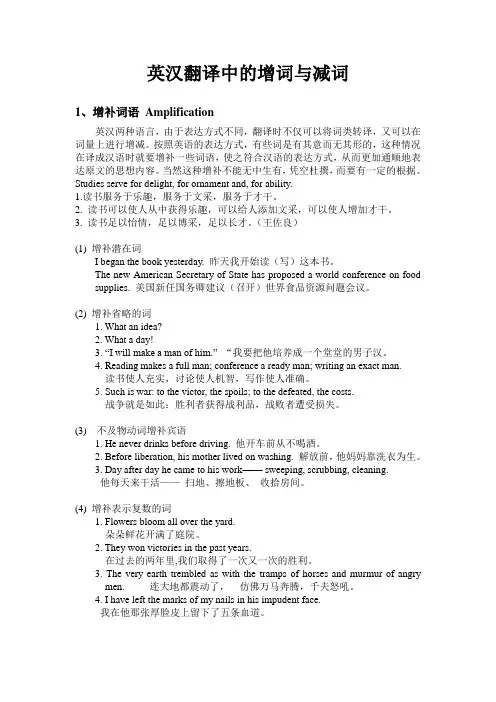
英汉翻译中的增词与减词1、增补词语Amplification英汉两种语言,由于表达方式不同,翻译时不仅可以将词类转译,又可以在词量上进行增减。
按照英语的表达方式,有些词是有其意而无其形的,这种情况在译成汉语时就要增补一些词语,使之符合汉语的表达方式,从而更加通顺地表达原文的思想内容。
当然这种增补不能无中生有,凭空杜撰,而要有一定的根据。
Studies serve for delight, for ornament and, for ability.1.读书服务于乐趣,服务于文采,服务于才干。
2. 读书可以使人从中获得乐趣,可以给人添加文采,可以使人增加才干。
3. 读书足以怡情,足以博采,足以长才。
(王佐良)(1) 增补潜在词I began the book yesterday. 昨天我开始读(写)这本书。
The new American Secretary of State has proposed a world conference on food supplies. 美国新任国务卿建议(召开)世界食品资源问题会议。
(2) 增补省略的词1. What an idea?2. What a day!3. “I will make a man of him.”“我要把他培养成一个堂堂的男子汉。
4. Reading makes a full man; conference a ready man; writing an exact man.读书使人充实,讨论使人机智,写作使人准确。
5. Such is war: to the victor, the spoils; to the defeated, the costs.战争就是如此:胜利者获得战利品,战败者遭受损失。
(3) 不及物动词增补宾语1. He never drinks before driving. 他开车前从不喝酒。
2. Before liberation, his mother lived on washing. 解放前,他妈妈靠洗衣为生。
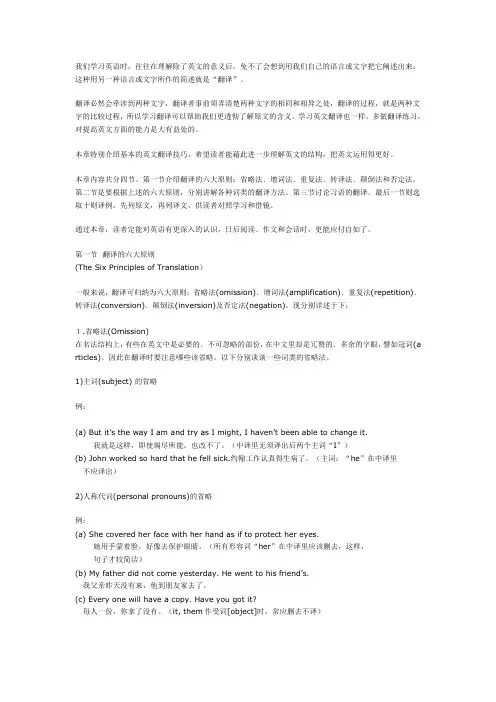
我们学习英语时,往往在理解除了英文的意义后,免不了会想到用我们自己的语言或文字把它阐述出来,这种用另一种语言或文字所作的简述就是“翻译”。
翻译必然会牵涉到两种文字,翻译者事前须弄清楚两种文字的相同和相异之处,翻译的过程,就是两种文字的比较过程,所以学习翻译可以帮助我们更透彻了解原文的含义。
学习英文翻译也一样。
多做翻译练习,对提高英文方面的能力是大有益处的。
本章特别介绍基本的英文翻译技巧,希望读者能藉此进一步理解英文的结构,把英文运用得更好。
本章内容共分四节。
第一节介绍翻译的六大原则:省略法﹑增词法﹑重复法﹑转译法﹑颠倒法和否定法。
第二节是要根据上述的六大原则,分别讲解各种词类的翻译方法。
第三节讨论习语的翻译。
最后一节则选取十则译例,先列原文,再列译文,供读者对照学习和借镜。
通过本章,读者定能对英语有更深入的认识,日后阅读﹑作文和会话时,更能应付自如了。
第一节翻译的六大原则(The Six Principles of Translation)一般来说,翻译可归纳为六大原则:省略法(omission)﹑增词法(amplification)﹑重复法(repetition)﹑转译法(conversion)﹑颠倒法(inversion)及否定法(negation)。
现分别详述于下:1.省略法(Omission)在名法结构上,有些在英文中是必要的﹑不可忽略的部份,在中文里却是冗赘的﹑多余的字眼,譬如冠词(a rticles)。
因此在翻译时要注意哪些该省略。
以下分别谈谈一些词类的省略法。
1)主词(subject) 的省略例:(a) But it’s the way I am and try as I might, I haven’t been able to change it.我就是这样,即使竭尽所能,也改不了。
(中译里无须译出后两个主词“I”)(b) John worked so hard that he fell sick.约翰工作认真得生病了。
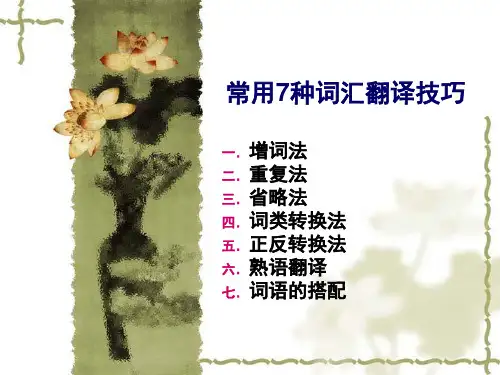
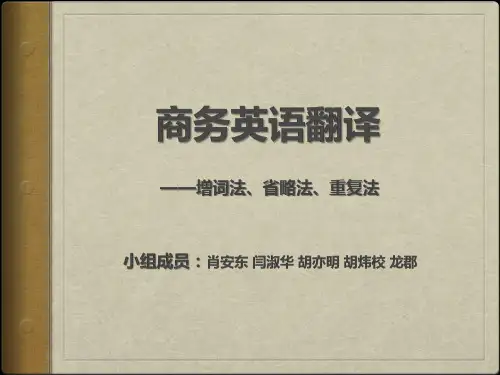
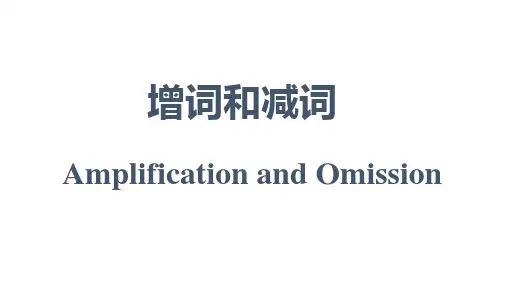
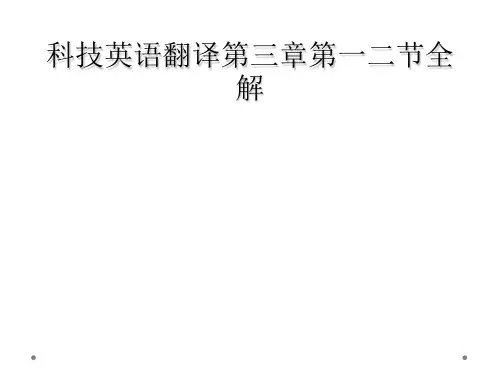
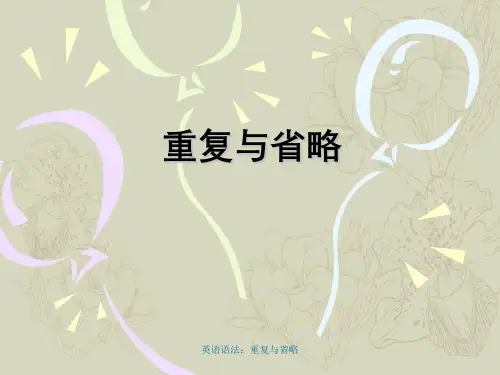
最全英语翻译方法大全(4)译文加上 to begin with (起初,开始时),使上下文逻辑连贯, 加上but when使英语文理通顺。
第三节省略法省略法(Omisssion),是指不译出原文中的某些词。
正如增词法不是随意增加原文的意思一样,省略法也不是要删去原文的意思,而是省去那些在译文中不言而喻的字词,或省去那些译出来反嫌累赘或不合汉语习惯的词语。
一般来说,省略有的是出于结构上的需要,有的是出于修辞上的需要。
现在分类举例说明。
一、英译汉时的结构性省略结构性省略,也称句法省略,主要是省略虚词,如代词,冠词,介词,连词等。
例如:•Follow the river and you will get to the sea.顺藤摸瓜。
(省略代词和冠词)•Let me tell you, time is a very precious gift of God; so precious that He only give it to us moment by moment. He would not have you waste it.让我来告诉你吧,时间是上帝赐予的极其珍贵的礼物。
惟其珍贵,他才一点一点地赐予。
他不愿让你白白浪费。
(省略代词,冠词和介词) •In my childhood, I experienced a great deal about poverty and suffering.童年时代我就体味了贫穷和苦难(省略介词和代词)•We live and learn.活到老,学到老(省略代词)•It is a good horse that never stumbles.好马也有失蹄时。
(或:智者千虑,必有一失)(省略代词)•If winter comes, can spring be far behind?冬天来了,春天还会远吗?(省略连词if)从以上例子可以看出,翻译时虚词的省略可使译文显得简洁,洗练,也符合汉语“形合”的特点。
2.十种翻译技巧了解完四种翻译方法后,我们再来了解一下十种常用翻译技巧,即重复法(repetition),增词法(amplification),省略法(omission),词类转换法(conversion),词序调整法(inversion),拆译法(division),正说反译和反说正译法(negation),语态变换法(voice changes),引申法和句子成分转译法。
2.2.1重复法(repetition)重复法(repetition)是在翻译中,为了使译文忠实于原文并且产生意义明确,文字通顺、流畅,符合目的语习惯的文字,而将某一部分文字反复使用的翻译技巧。
例子:1. You must ask the mother at home, the children in the street, the ordinary manin the market and look at their mouth, how they speak, and translate that way; then they’ll understand and see that you’re speaking to th em in German. (重复谓语动词)你一定要问一问家庭主妇们,问一问街头玩耍的孩子,问一问集市上做买卖的百姓,听听他们说些什么,他们如何说,你就如何译;这样他们就会理解,就会明白:你是在用德语和他们讲话。
2. We have to analyze and solve problems. (重复宾语)我们必须分析问题,解决问题。
3. Ignorance is the mother of fear as well as of admiration. (重复省略的部分) 无知是畏惧之源,羡慕之根。
4. But we still have defects, and very big ones. (指代内容的重复)但我们仍有不足,而且是很大的不足。
Unit 3 增词法和减词法Amplification and Omission▪一、为了保证语法结构的完整:▪代词:汉语中有许多没有主语的句子,英语则一般需要主语。
另外汉语中很多名词前都没有代词,需要增补。
▪1.大作收到,十分高兴。
I am very glad to have received your writing.▪2.没有调查就没有发言权。
He who makes no investigation and study has no right to speak. ▪3.把这些故事看完以后,用你自己的话讲一遍。
▪After you have read these stories, tell them in your own words.4.我们响应了祖国的号召。
We responded to the call of our motherland.▪5.她用手蒙住脸,好象是为了保护眼睛。
▪She covered her face with her hands, as if to protect her eyes.▪6.孩子们天天带午饭到学校去吃。
The children take their lunch to school every day.▪7.我们的心永远向着祖国。
Our hearts are always towards our motherland.连词:汉语重意合,英语重形合,把汉语翻译成英语时,要适当增加连词。
1. 虚心使人进步,骄傲使人落后。
Modesty helps one to go forward, whereas conceit makes one lag behind.2.留得青山在,不怕没柴烧。
So long as green hills remain, there will never be a shortage of firewood.3.村里的男女老少都喜欢那个小超市买东西。
第三章增词法、重复法和省略法教学目的:让学生能在英汉翻译时使用增词法、重复法和省略法重点、难点:增词法、重复法方法:讲解、提问、讨论教学步骤:有些词语在英语中使用比较广泛(如关联词、代词)或者不能随便省略(如冠词、虚词it、联系动词等),而在汉语却使用较少或可以省略;有些词语在汉语中使用比较广泛(如范畴词、量词、语气助词等)而在英语中却可以省略或较少使用。
(-)增减关联词由于汉语意合句多,不强调形式上的完整,只要不妨碍意义的表达,即可省去形式上的东西,英语形合句多,注重把各种关系用语言形式表达出来。
所以在汉译英时往往需要增补必要的关联词(连词、介词等);在英译汉时则往往可以省去这些关联词。
(1)传统的出口商品丰富多彩。
(2)他在中国工作了一年,然后就回日本去了。
(3)好事不出门,坏事传千里。
The array of the traditional products for export are rich and colorful.He worked in China for one year,and then he returned to Japan.A good thing is known only within one's family,but a bad thing is known far and wide.(4)留得青山在,不怕没柴烧。
(5)我通宵没睡,非常疲倦。
(6)人生自古谁无死,留取丹心照汗青。
As long as the green mountains remain, one needn't worry about fire-wood.I was fatigued because I had sat up all night.An death befalls all men alike,I…ll keep a loyal heart to make a name in history.(7)空气很轻,也具有重量。
(8)公共场合不准抽烟。
(9)这屋子冬暖夏凉。
(10)我们早8点上班。
Air has weight,though it is very light.Smoking is not allowed in public places.This room is warm in winter and cool in summer.We go to work at 8 in the morning(11)If I had known this beforehand,I would not have gone back.早知如此,我就不回去了。
(12)Will you call as soon as you can conveniently spare a moment?可否请你有空就来一下?(13)Take the whole into consideration,but do the job bit by bit.大处着眼,小处着手。
(14)As it was getting very late,we soon turned back.天很晚了,我们马上就回来了。
(15)The soft can overcome the hard,and the weak can defeat me strong.柔能克刚,弱能制强。
(16)He will not leave until his business is concluded.他不把事办完是不会走的。
(17)The Spring Festival is celebrated joyfully in all parts of the country.全国各地都在欢度春节。
(18)Most substances expand on heating and contrast on cooling.大多数物质都热胀冷缩。
(19)In whiter,it is much colder in the north than it is in the south.冬天,北方比南方冷得多。
(20)The force due to gravitation causes objects to have weight.地心引力使物体具有重量。
(二)增减代词英语中为了避免重复名词,往往使用代词,特别是人称代词和物主代词的使用极为广泛;而汉语中却使用代词较少,只要不妨碍意义的表达,往往要把代词省去。
所以英译汉时往往可以省略代词(或把代词改换为名词);汉译英时则往往需要增补必要的代词。
(1)那位老人把手插在口袋里在田野里散步(2)原子虽小,但具有很大的能量。
The old man was walking in the field with his hands in his pockets.Small as atoms are,they contain vast amounts of energy.(3)我上周给他写去一封信,但不知收到没有。
(4)请你原谅,我以后不再提这事了。
I wrote a letter to him last week, but I wonder if he has received it.Please excuse me,I shall not speak of the matter.That dress was so expensive that I couldn't afford to buy it.(6)As soon as I arrived at Shanghai,I will send you a telegram.那件衣服很贵,我买不起。
我一到上海,就给你打电报来。
(7)Shall I pour you a cup of tea?(8)How are you feeling today?要给你倒杯茶吗?今天感觉怎么样?(三)增减联系动词由于汉语的描写句一般没有联系动词(即不用动词作谓语,而直接用形容词、名词、介词、短语、或主谓结构作谓语),汉译英时须补上联系动词,有时需将汉语句中形容词前的“很”字省去;英译汉时要省去联系动词;如果汉语中形容词作谓语,往往在前面要增补一个“很”字。
(1)北京的秋天最美。
(2)今天天气很好。
(3)这苹果很甜。
Autumn is the most beautiful season in Beijing.The weather is fine today.The apple tastes sweet.(4)We are happy that you have got well.你病好了,我们很高兴。
(省略联系动词are和have got,在“高兴”前加“很”字,并将原文第二个谓语译成主谓结构)(5)He has grown old.他老了。
(省略联系动词has grown)(6)That sounds quite reasonable.那很有道理。
(省略联系动词sounds)(7)Everything is in good order.一切井井有条。
(省略联系动词is)(四)增减虚词“it”英语中无人称代词it,强调句中的it,和语法上作形式主语或形式宾语的it,是汉语中所没有的一种虚词。
因此一般说来,在汉译英时要将it补上,在英译汉时要省去不译。
(1)12点钟了。
It is twelve o'clock.(2)一天天暖和起来了。
It is getting warm day by day.(3)第一次见到她是在法国。
It was in France that I first met her.处理这件事是我们的责任。
It is our duty to attend this matter.(5)他们认为为国为民工作是他们的义务。
They regarded it is as their duty to work for the country and the people.(6)抱怨是无用的。
It's no use complaining.(7)是难呀?——是我。
Who is it?It's me.(8)Is it far to the station?——No,it's quite near.火车站远吗?——不远,很近。
(9)It was John who bought it.这是约翰买的。
(10)It is me,not you,that is to blame.应该受到责备的是我,而不是你。
(11)Who was it that called yesterday evening?昨晚来的是谁?(12)It's rather windy today.今天风挺大。
(13)It will be lovely in the park today.今天公园一定很好玩。
(五)增减冠词由于英语中的冠词是汉语中所没有的,在汉译英时往往需作必要的增补,而在英译汉时,则可以省去不译。
(1)请把门关上。
Shut the door,please.(2)整体大干部分。
The whole is greater than apart.(3)为人民服务是极大的快乐。
It is a great joy to serve the people.(4)把练习做完了吗?Have you finished doing the exercise?(5)任何物质,不管它是固体、液体或气体,都是由原子组成的。
Any substance is made up of atoms whether it is a solid,a liquid or a gas.(6)His father is an engineer.他父亲是工程师。
(7)Beijing is the capital of China.北京是中国的首都。
(8)He is a great loss to the country.他的去世是国家的重大损失。
(9)Pollution is injurious to the lungs.污染有害于肺。
(10)The commander-in-chief inspected a frontier guard unit.总司令观察了边防部队。
(六)增减范畴词英语中有些表示动作或性质的抽象名词(特别是由动词或形容词派生的名词),有时指人或事物的具体行为或性质,译成汉语时要增补范畴词(category words),以表示某种行为或某种性质所属的范畴。
但汉译英时,由于范畴词只表明范畴而没有新的含义,所以可以省去不译。
(1)The preparations for the conference are being made.会议的准备工作正在进行。